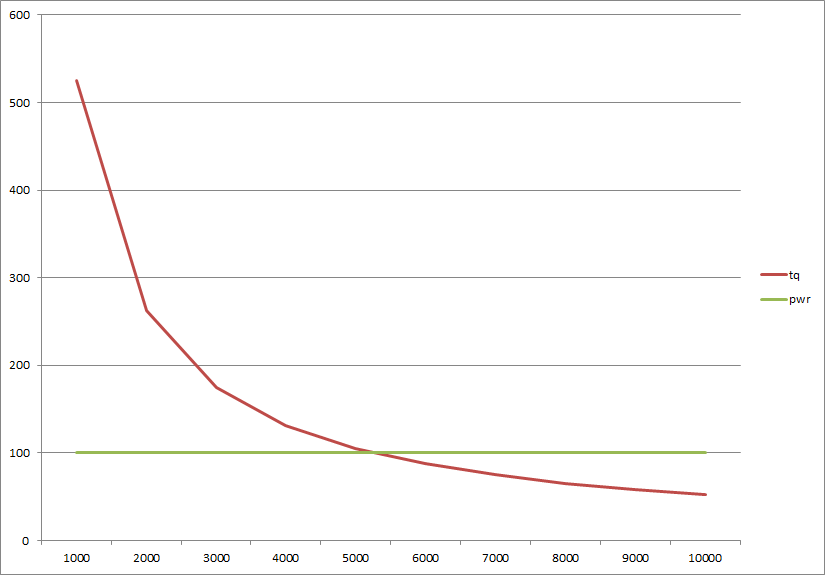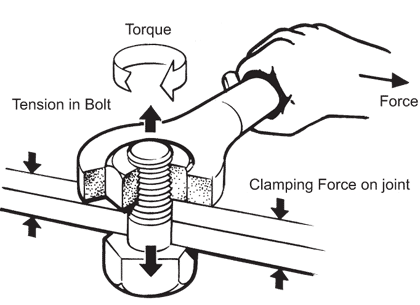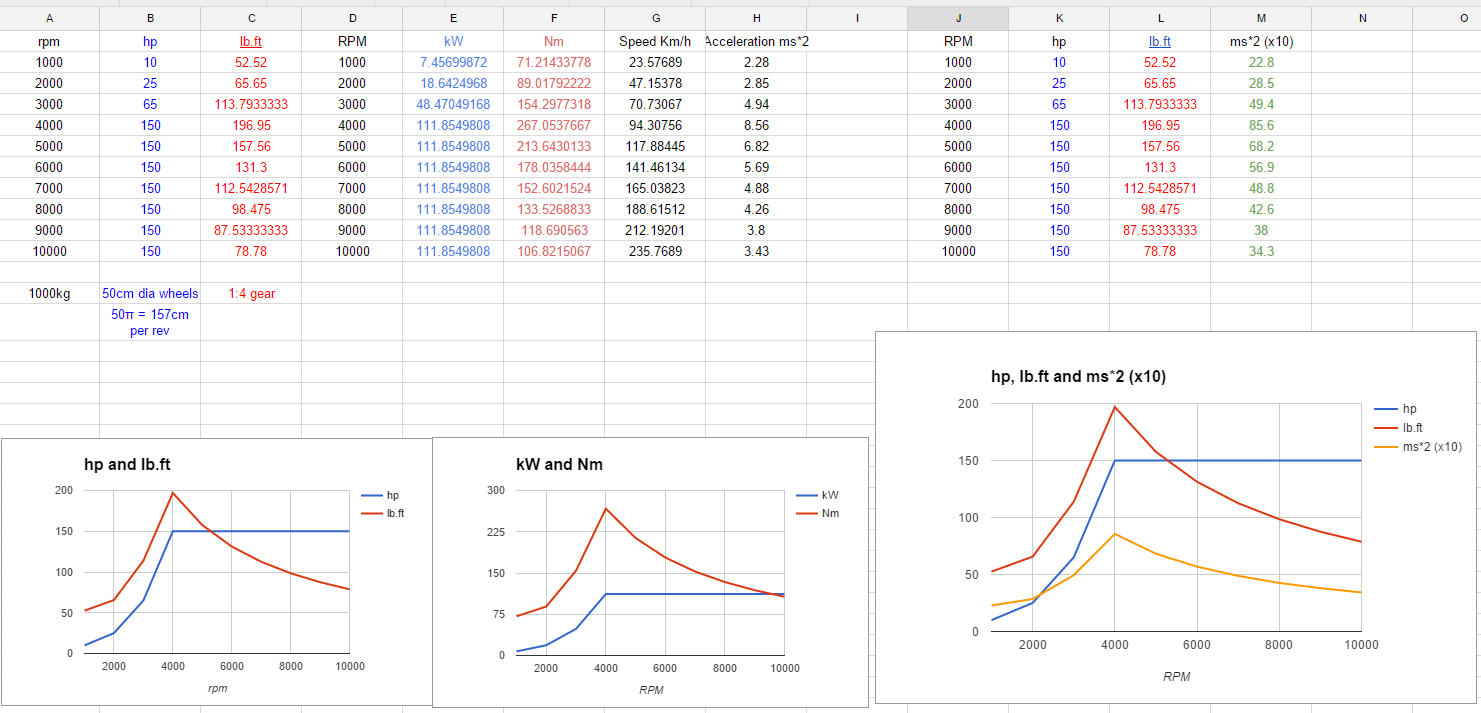Acceleration curve vs torque curve vs HP curve.
#101
Former Vendor

iTrader: (31)
Join Date: Nov 2006
Location: Sunnyvale, CA
Posts: 15,442
Total Cats: 2,099
Another way to think of is to consider the kinetic energy of a vehicle, which is 1/2*mass*velocity^2. At higher velocities, more energy is required for a 1mph increase in speed. Thus for a given power, more time is required for that larger increase in energy, thus acceleration must be lower.

#103
Former Vendor

iTrader: (31)
Join Date: Nov 2006
Location: Sunnyvale, CA
Posts: 15,442
Total Cats: 2,099
If power is constant, and power is work/time.
Then as we increase RPM, the car travels further per unit of time.
If power is flat from 5000rpm>10,000rpm then torque is halved at 10,000rpm.
At 10,000rpm we have the same amount of work achieved per unit of time compared to 5,000rpm because horsepower is the same, but that same amount of work is stretched in half because it has to move the car double the distance.
Work achieved is how far the car is moved.
If the same amount of power has to move the car twice as far in the same unit of time, how can it possibly have enough energy left over to accelerate it just as forcefully as at 5,000 rpm when that same amount of power only had to do half of the work in a given period of time?
Then as we increase RPM, the car travels further per unit of time.
If power is flat from 5000rpm>10,000rpm then torque is halved at 10,000rpm.
At 10,000rpm we have the same amount of work achieved per unit of time compared to 5,000rpm because horsepower is the same, but that same amount of work is stretched in half because it has to move the car double the distance.
Work achieved is how far the car is moved.
If the same amount of power has to move the car twice as far in the same unit of time, how can it possibly have enough energy left over to accelerate it just as forcefully as at 5,000 rpm when that same amount of power only had to do half of the work in a given period of time?
If you re-gear the 10,000rpm example so that it only covers the same distance as the 5,000rpm example, it has 2x the gear reduction, which multiples the lower torque at the hub by 2x, resulting in the same torque output at the hub in both examples, and therefore the same acceleration force.
#104
Former Vendor

iTrader: (31)
Join Date: Nov 2006
Location: Sunnyvale, CA
Posts: 15,442
Total Cats: 2,099
Oops, I contradicted myself. 
It won't accelerate harder with higher power unless you maintain road speed by multiplying the gear ratios by 10 as well.
10hp, 10ft.lb, 5252rpm, 1:1 gear ratio, 10ft.lb at the hub.
100hp, 10ft.lb, 52,520rpm, 10:1 gear ratio, 100ft.lb at the hub. Same engine torque, more hub torque.
1,000hp, 10ft.lb, 525,200rpm, 100:1 gear ratio. 1,000ft.lb at the hub. Same engine torque (10ft.lb), but heavily gear reduced to create huge acceleration.

Let's say you have a hypothetical car, and it's operating in the hypothetical universe we're talking about (no aero drag, no rolling resistance, no drivetrain losses, perfect efficiency). It is making a flat 10ft.lbs of torque at the flywheel, regardless of engine speed. (It's a very small engine, able to rev infinitely high.) At 5252rpm, you have 10hp available to you. At 52,520rpm, you have 100hp available to you. Will the car not accelerate harder with 100hp than it will with 10hp?
Multiply RPM by 10 again. 525,250rpm, 1,000hp. Still just 10ft.lbs of engine torque, and yet the car is now making a thousand horsepower. Can you honestly say that the car will not accelerate at a higher rate with a thousand horsepower than it will with just ten horsepower? Remember, engine torque has not changed at all.
Multiply RPM by 10 again. 525,250rpm, 1,000hp. Still just 10ft.lbs of engine torque, and yet the car is now making a thousand horsepower. Can you honestly say that the car will not accelerate at a higher rate with a thousand horsepower than it will with just ten horsepower? Remember, engine torque has not changed at all.
10hp, 10ft.lb, 5252rpm, 1:1 gear ratio, 10ft.lb at the hub.
100hp, 10ft.lb, 52,520rpm, 10:1 gear ratio, 100ft.lb at the hub. Same engine torque, more hub torque.
1,000hp, 10ft.lb, 525,200rpm, 100:1 gear ratio. 1,000ft.lb at the hub. Same engine torque (10ft.lb), but heavily gear reduced to create huge acceleration.
#106
Former Vendor

iTrader: (31)
Join Date: Nov 2006
Location: Sunnyvale, CA
Posts: 15,442
Total Cats: 2,099
They rise and fall in a completely linear relationship. So yes, hub torque accelerates the car, but so does power. It's just a different way of thinking about it.
My point in the 40 posts-in-a-row above is that hub torque matters, but engine torque does not. You can have high acceleration rates without high engine torque, but you cannot have high acceleration rates without high hub torque or high power.
My point in the 40 posts-in-a-row above is that hub torque matters, but engine torque does not. You can have high acceleration rates without high engine torque, but you cannot have high acceleration rates without high hub torque or high power.
#115

In this case, you'll have monster accelration (infinity) at zero RPM falling rapidly at first before trying to level off as to only approach zero torque at infinity rpm.
If acceleration is based on wheel torque, then notice how:
Fooger: Acceleration will indeed dramatically reduce with engine speed *if power is constant*, because in order to keep power constant while engine speed increases we have to dramatically reduce engine torque.
Also:
Fooger: We can also say that generally as engine speed increases, acceleration dramatically reduces *relative to power*
engine torque and acceleration have no correlation at all
Also, keep in mind that "Torque" and "Horsepower" are instantaneous measurements based on physics curves, and "Maximum Horsepower" and "Maximum Torque" are point measurements based on marketing hypes.
Last edited by fooger03; 03-05-2016 at 09:10 AM.
#116
a=P/(m*v) or regrouped as a=1/m*P/v
If P/V is constant, and mass is obviously constant, then acceleration is constant. So power has to increase linearly with vehicle speed.
Technically a constant torque vs RPM engine achieves this constant P/v as power in increasing linearly as RPM increases. BUT the very critical notation here is that this is only valid for one gear. As soon as you upshift, you've dropped back to low rpm and low power. Now you'll have constant acceleration again, but at a lower acceleration rate.
As Andrew was explaining earlier, here it is again:
Engine torque is a poor metric to use to determine vehicle acceleration as it alone is insufficient information to do anything with. You have to know and factor in all of the gearing in the trans, diff, tire diameter in order to have any idea of vehicle acceleration.
#118
What Jason (and I) are trying to say is that engine torque and acceleration have no correlation.. You can double or triple your engine torque, but if you only make that torque at 1/2 or 1/3 the engine speed, the power output remains the same, and acceleration will be the same. So yes, [i]engine[i] torque, as measured at the flywheel, is irrelevant.
If you change engine torque while maintaining the same power, acceleration will not change. If you change engine power while maintaining the same engine torque, acceleration will change. Thus, engine torque and acceleration have no correlation.
Sure, but only because wheel torque and engine power rise and fall in lock-step. You cannot increase wheel torque without increasing engine power at a given road speed.
This is completely false.
If engine power is constant, and the car is operating in a magical universe where there is no such thing as rolling resistance, drivetrain losses, or aerodynamic drag, then the car will accelerate at a constant rate.
The definition of power is a unit of energy consumed per time. Applying 200hp of energy to a body will cause that body to convert that energy into momentum. There is no engine speed at which the conversion of this energy into momentum will become less efficient, or happen at a slower rate, or cease to happen at all.
If that paragraph confused you, think about it this way. Let's say you have a hypothetical car, and it's operating in the hypothetical universe we're talking about (no aero drag, no rolling resistance, no drivetrain losses, perfect efficiency). It is making a flat 10ft.lbs of torque at the flywheel, regardless of engine speed. (It's a very small engine, able to rev infinitely high.) At 5252rpm, you have 10hp available to you. At 52,520rpm, you have 100hp available to you. Will the car not accelerate harder with 100hp than it will with 10hp?
Multiply RPM by 10 again. 525,250rpm, 1,000hp. Still just 10ft.lbs of engine torque, and yet the car is now making a thousand horsepower. Can you honestly say that the car will not accelerate at a higher rate with a thousand horsepower than it will with just ten horsepower? Remember, engine torque has not changed at all.
This is also completely false, for all the reasons explained above.










